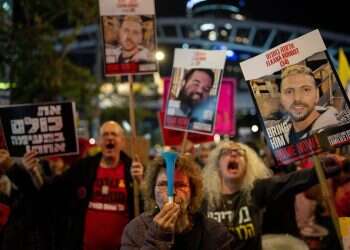For much of the modern era, the Arab world has sought ways to provide legitimacy to its political leadership. That led it down the road of highly ideological politics based on promoting Arab unity schemes even with the use of force, experimenting with Arab socialist doctrines, and maintaining at all costs the Arab-Israel conflict.
Follow Israel Hayom on Facebook and Twitter
A few brave leaders were prepared to break with this paradigm and reached peace with Israel, such as President Anwar Sadat of Egypt, and King Hussein of Jordan. Most recently King Hamad of Bahrain and Sheikh Zayed of the UAE have joined. Peace with Israel was not a risk-free strategy and some of these leaders' enemies were prepared to threaten them with assasination attempts and increased political turmoil. But they persisted nonetheless in the path of peace.
Now King Muhammad VI has bravely moved the Kingdom of Morocco into the circle of states making formal peace with Israel. It is a move that is not without risks for the Moroccans. The security challenges that they face primarily emanate from the area of the former Spanish colony of the Western Sahara, where an insurgency campaign is being waged by guerrillas from the Polisario front against the Moroccan security forces, with the support of Algeria. Morocco had valid claims to this disputed teerritory; many tribes in the area had been historically linked to the Moroccan monarchy.
The stakes in this conflict were considerable. The Polisario, who are also backed by the Iranian regime, also seek to undermine the territorial integrity of Morocco itself. In 2018, Morocco presented documents to the Iranian government proving that Tehran was now arming and training the Polisario with the help of Hizbullah; these included shoulder-fired anti-aircraft missiles like the SAM-9 and SAM-11. As a result of this material, Morocco cut its diplomatic ties with Iran. It turned out that the Iranians were using their embassy in Algiers as a conduit to the Polisario.
This was part of a pattern that the Iranians were following in Africa-seeking to infiltrate the continent by backing military moves of allies they sought to cultivate. In late 2019, the UN obtained photographs of weapons used by Khalifa Haftar's Libyan National Army that included anti-tank guided missiles which were believed to be Iranian-made weapons. The Iranians also sought to promote the conversion of African Sunnis to Shiism, which exacerbated the tensions between Tehran and a number to Sunni states. Sheikh Yousuf al-Qaradhawi, a spiritual head of the Muslim Brotherhood, charged in the local press in a number of countries that Iran was seeking to infiltrate Egypt, Sudan, Tunisia, Algeria, and Morocco.
There were several lessons for the West from these episodes. First, it was clear that the Polisario, far from being a national liberation movement deserving global backing, were emerging as an organization that had no problem linking itself to the terrorist network Iran had established across the Middle East and Africa. What would the Western powers do? They did not have to send their air forces to North Africa. But they could deny the Polisario their diplomatic goals.
After Syria hosted Iranian proxy forces in large numbers, the US issued a proclamation in March 2019 recognizing Israeli sovereignty over the Golan Heights. After the Polisario decided to work with Iran, an equivalent move of recognizing Moroccan sovereignty over Western Sahara made perfect sense. It was extremely important to send a message to other players as well.
Subscribe to Israel Hayom's daily newsletter and never miss our top stories!
It was a strategy that was working. Already Bahrain, Jordan, and the UAE all had spoken about opening up a Moroccan consulate on the territory of the Western Sahara. South Africa's President, Cyril Ramaphosa, distanced his country from Polisario claims. It was significant given the fact that South Africa,besides being the most powerful country in Africa, also held the presidency of the African Union. If the US wished to reinforce political moderation across the region and weaken the axis of extremism then reinforcing Morocco's position on the Sahara issue was a wise approach to follow. That logic helped lead to the birth of the Moroccan Sahara.
The connection between peacemaking efforts now being pursued by Israel and Morocco and the situation in the Western Sahara is not complicated. When the voices of Arab moderation are secured, peace can become a reality. But if Iran enters undisturbed, then any peace can be undermined. The resolve of the US and its allies can make all the difference in setting the stage for a new era in the Middle East.
Dr. Dore Gold is the President of the Jerusalem Center for Public Affairs. He served as Director-General of Israel's Ministry of Foreign Affairs and its ambassador to the United Nations.




